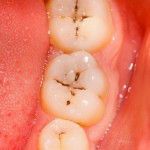
Caries is one of the world’s commonest diseases with approximately 48% of the global population being affected. It results from the interplay between the tooth, carbohydrates in the diet and cariogenic bacteria in the dental biofilm. Diabetes mellitus is an common endocrine disease characterised by sustained high blood sugar levels affecting more that 500 million people worldwide. An association between tooth loss from periodontitis in diabetics has been reported (Dental Elf – 10th Sep 2021) with studies also reporting a link between diabetes and caries although this is more controversial.
The aim of this review was to assess whether caries experience as measured by the DMF index is higher in adult diabetes mellitus (DM) patients than individuals without DM (non-DM).
Methods
A protocol for the review was registered with the PROSPERO database. Searches were conducted in the Medline/PubMed and Cochrane Central databases. Cohort, case-controlled, or cross-sectional studies examining caries status in DM and non-DM patients ≥ 18 years old using DMF, DMFT, or DMFS indices and published in English were considered. DM status could be self-reported or clinically assessed. Two reviewers independently selected studies assessed study quality and extracted data. The Quality assessment tools included the Joanna Briggs Institute checklist for analytical cross-sectional studies (JBI-tools), the Newcastle Ottawa scale (NOS) adapted for cross-sectional studies , and the Risk Of Bias In Non-randomized Studies -of Exposure (ROBINS-E) tool. Meta-analyses were undertaken where possible and the overall certainty of evidence assessed using the grading of recommendations assessment, development, and evaluation (GRADE) framework.
Results
- 13 studies (12 cross-sectional, one case-control) involving a total of 21,220 (5,388 DM, 15,832 non-DM) individuals were included.
- 6 studies were from Asia, 4 from Europe, 2 from North America ns one from South America with sample sizes ranging from 42 to 13,998.
- One study was considered to be at low risk of bias, 8 studies at moderate risk and 4 at serious risk of bias.
- % of the 13 included studies did not find a significant difference in DMF scores.
- 7 studies contributed to the meta-analyses which indicated statistically significant higher DMFT/DMFS in patients with DM : –
- DMFT, mean difference = 3.01 (95%CI: 1.47 to 4.54) [7 studies].
- DMFS, mean difference = 10.30 (95%CI: 8.50 to 12.11) [2 studies].
- The certainty of the evidence was assessed as moderate.
Conclusions
The authors concluded: –
There is moderate certainty for a higher DMF index score in DM patients as compared to non-DM individuals.
Comments
The authors registered their protocol on the PROSPERO database. While two major databases were searched there is no indication in the main paper of that a number of grey literature sources mentioned in the protocol were searched. While there were no search restrictions on date or language of publication only English language publications were considered with the authors indicating that potentially at least 6 foreign language papers may have been excluded which could have implications for the findings. While the DMFT/S indices are a widely used caries indicator it does have drawbacks as it assumes that all missing teeth and all restorations are the result of caries, does not distinguish between restorations for aesthetic reasons or preventive resin restoration. All but one of the included studies are cross-sectional in nature with considerable heterogeneity in elements of the study designs, populations and diagnostic and assessment methods, for example, 4 papers did not clearly assess how diabetic status was assessed. The findings do suggest that DMF scores are higher in diabetic than non-diabetic patients with the authors assessing the certainty of evidence as moderate however as the risk of bias for the included studies was mainly moderate to serious this may be on the generous side. Future studies should use include more consistent information on potential confounders.
Links
Primary Paper
Weijdijk LPM, Van der Weijden GA, Slot DE. DMF scores in patients with diabetes mellitus: A systematic review and meta-analysis of observational studies. J Dent. 2023 Sep;136:104628. doi: 10.1016/j.jdent.2023.104628. Epub 2023 Jul 23. PMID: 37490966.

good , i had a lecture at the national conference centre on dental care for diabetes patient at the PCDS conference and it highlighted the importance of dental care